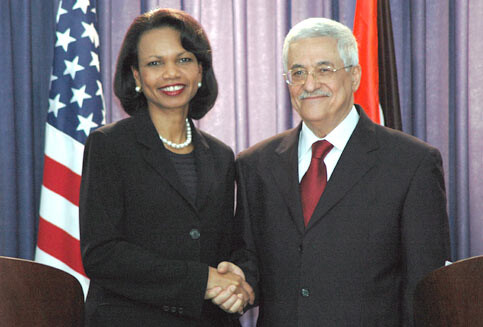The Electronic Intifada 18 December 2006

US secretary of State Condoleeza Rice and Palestinian President Mahmoud Abbas shake hands after a press conference in the West Bank town of Ramallah November 14, 2005. (MAANnews/Charlotte de Bellabre)
Palestinians don’t want fresh elections in the occupied territories, but a free vote for a truly national ruling body.
“Let the people decide for themselves what they want,” declared Mahmoud Abbas, the Palestinian Authority president, yesterday. But there already is a national consensus, an underlying unity in a common platform. The Palestinian people are agreed: indeed there must be Palestinian elections, but not another round of elections in the occupied Palestinian territories, for a president of the Palestinian Authority or for its legislative council.
The elections that all Palestinians are demanding today (the millions under occupation and the millions in the refugee camps outside) are for the Palestine National Council, the parliament in exile, which is the national body that represents all Palestinians. The PNC is the institutional body that forms the sovereign base of the Palestine Liberation Organisation, which is the sole legitimate representative of the Palestinian people, recognised as such by the United Nations, the Arab League, the US the EU, and the Palestinian people themselves.
The Palestinian people under occupation have already elected a legislative council under occupation that represents a portion of the body politic. Today Palestinians demand elections for the entire Palestinian population. The prisoners’ “document of national unity”, agreed this summer, reflects that popular demand, and made it a primary article of consensus and agreement between the parties.
The moment Fatah lost power in the legislative elections to Hamas in January, it was obliged to take a step that would have brought it closer to the people it sought to represent. It was obliged to step aside, accept the outcome of that election, and the brute fact that its party had been defeated. In this way it could have availed itself of the many democratic benefits that accrue to those who lose power in an election: the opportunity to reconnect to constituents, to learn why they had lost, to discover what they had to do to regain their people’s trust, to encourage them to cease being leaders who worked for others, and begin the difficult but rewarding process of becoming representatives again.
Instead, they were told they were still in power, and told by the “international community” they had to play this role or take responsibility for abandoning their suffering people to even more cruel fate than what they were currently enduring in Gaza and the West Bank and occupied Jerusalem.
And so, what we are witnessing today is the horrific and inevitable outcome of a process of deliberate coercion, designed to force an occupied people to surrender their elected representatives. That this coercion is being carried out by the iron fist of military occupier Israel, which is withholding vital Palestinian taxes, and its neocon backers, the US administration, is to be expected - and to be resisted.
What is harder to understand is just how this coercion can be so flagrantly insisted upon by the British, by the European Union, by the very actors who should be standing by the Palestinians - if not for the shared common values of decency and morality, then as part of their contractual responsibilities as co-signatories to the fourth Geneva convention, obligating them both to respect and ensure respect of the treaty that protects a civilian population under military occupation.
The Palestinian people have indeed already spoken: for elections to the Palestine National Council, for lifting the economic boycott of a democratically elected authority; for liberty and to independence.
Karma Nabulsi teaches politics and international relations at Oxford University. She is the author of Traditions of War: Occupation, Resistance and the Law.




